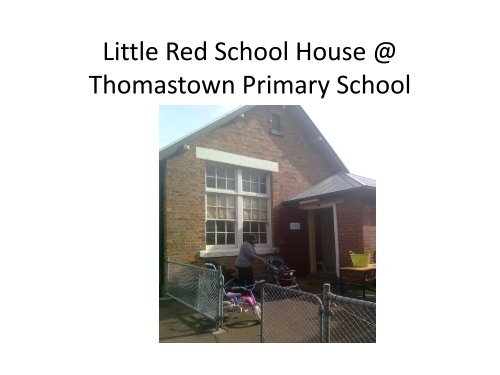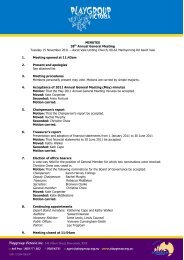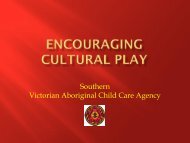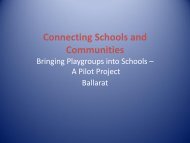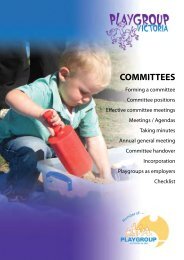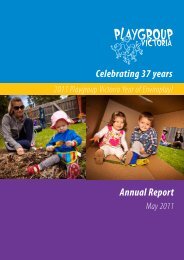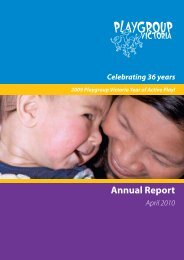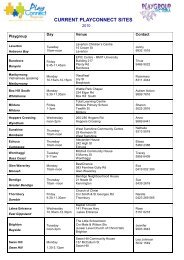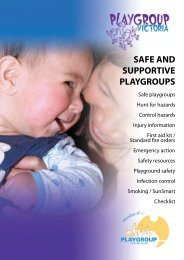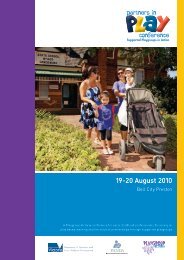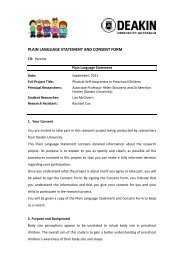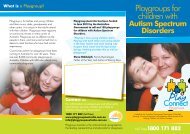Little Red School House @ Thomastown Primary School
Little Red School House @ Thomastown Primary School
Little Red School House @ Thomastown Primary School
Create successful ePaper yourself
Turn your PDF publications into a flip-book with our unique Google optimized e-Paper software.
<strong>Little</strong> <strong>Red</strong> <strong>School</strong> <strong>House</strong> @<br />
<strong>Thomastown</strong> <strong>Primary</strong> <strong>School</strong>
WE AIM TO<br />
• To provide quality play and social<br />
opportunities for children at a critical<br />
stage in their development.<br />
• To focus on all five areas, of early<br />
childhood development: physical health<br />
and wellbeing, social competence and<br />
emotional maturity, language and early<br />
literacy, communication skills and<br />
general knowledge.<br />
• To build parents skills, increase their<br />
capacity and confidence as parents so<br />
that they can nurture and support their<br />
child’s health, development, learning and<br />
wellbeing.<br />
• To increase families (particularly Mums)<br />
social participation, connections and<br />
linking them to other services and<br />
supports.
We run 4 sessions of Playgroup<br />
• Two sessions per week of a SPPI funded playgroup<br />
called “song, story and rhyme”. This is a hybrid Mother<br />
Goose program<br />
• One session per week of Pre Prep Playgroup (SPPI<br />
funded) addressing Australian early Developmental<br />
Index (AEDI) results and the poor school readiness of<br />
past prep children.<br />
• One session a week of a “Mondays song, story and<br />
rhyme Playgroup” ( special funding from the Education<br />
Department) to meet the increasing demand we were<br />
experiencing for extra playgroup places
The AEDI Community Profile for<br />
Whittlesea 2011<br />
Stated:<br />
“ The way to make meaningful changes to<br />
improve outcomes for the most vulnerable<br />
children is to address multiple environment risk<br />
factors rather than just focus on single issues.”<br />
Hence we focus on all five areas, or domains, of<br />
early childhood development: physical health and<br />
wellbeing, social competence, emotional<br />
maturity, language and cognitive skills (school –<br />
based), communication skills and general<br />
knowledge. (AEDI 2011)
Why has LRSH been successful<br />
• Not allowing barriers to prevent attendance<br />
• It’s not rocket science, but unless you are genuine, authentic and warm<br />
in ALL your engagement with families and their children you cannot<br />
develop trust and rapport to give you the privilege to work with<br />
families. These families face many challenges in their everyday life and<br />
their parenting so we need to earn the right to model parenting and<br />
assist them in their role as first educators.<br />
• Once trust and rapport was developed we could start to use incidental<br />
opportunities to engage parents, model parenting skills, impart<br />
information and knowledge<br />
• Developed rapport with Teachers and school staff<br />
• Shared highlights and improvements with <strong>School</strong> Principal and Council<br />
• Linked playgroup families with the local community and services, such<br />
as PVCH, MCH, Library, bank, Swimming pool, Fire Station, Community<br />
Connections, The Smith Family
• Made referrals to PVCH seamless, to encourage parents to use the<br />
services<br />
• Anytime we had valuable information to give or impact to parents,<br />
ensured that the first step always was to build confidence and<br />
rapport first. I.e. PVCH Dietician<br />
• Linking with “The Smith Family” who has been able to train and<br />
supply 2 volunteers who come to playgroup each Thursday. They<br />
don’t do cuppas and cleanup, they are seen as a valuable staff<br />
member and we work as a team on the days they are there.<br />
• Encouraging special events, ( celebrating birthday etc.) nurturing<br />
friendships.<br />
• Parents taking a role in the school. Playgroup families who move<br />
onto school seem to be more involved and engaged. So far we have<br />
seen Playgroup parents involved canteen, fund raising, the<br />
community /school garden and some special events.<br />
• Encouraging parents to be involved in some of the decision making<br />
at playgroup<br />
• Regular review and planning between TPS and PVCH


